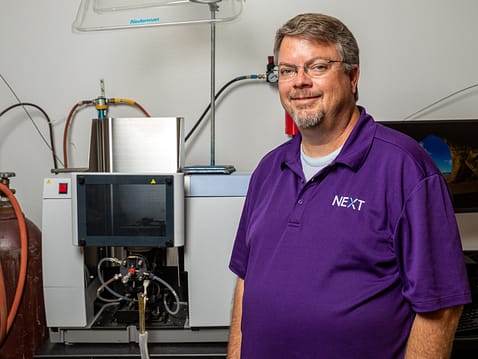
In the fall of 2017, Dr. Kim Pamplin (’91) added another hat to the stack he already was wearing – that of senior chemist with ACU’s Nuclear Energy eXperimental Testing Laboratory or NEXT Lab, as it’s best known.
Pamplin is a professor and former chair of chemistry and biochemistry, specializing in analytical chemistry. But the unique opportunity provided by working with students and other faculty in the NEXT Lab was too good to pass up. The research is multidisciplinary, with engineering, physics, chemistry, computer science and math students working alongside each other on experiments that could be world-changing.
“That’s been very rewarding to me,” Pamplin said.
NEXT Lab is a research program at ACU that is experimenting with using molten salts, rather than water, as a coolant for nuclear reactors. Inside the lab, students and faculty conduct experiments that could someday lead to global solutions to the world’s need for energy that is less expensive, water that is pure and abundant, and medical isotopes used to diagnose and treat cancer.
That is pretty heady stuff for ACU students and faculty. ACU is leading a collaborative effort with the University of Texas, Texas A&M University and Georgia Tech University, with each bringing a different strength to the table.
“ACU is making a name for itself,” Pamplin said.
The name will be even bigger if the university reaches its goal of building a nuclear reactor that utilizes molten salt. UT and A&M have research reactors, but ACU’s would be the only one of its kind, providing students with unparalleled opportunities for learning. Already, the university is benefiting from work being done in NEXT Lab, and the recognition is bringing tangible results.
“As it progresses,” Pamplin said, “I think its value will only increase.”
The creation of NEXT Lab already has attracted students to ACU. Victoria Garcia (’20), student success manager for the Department of Engineering and Physics, said several students have cited NEXT Lab as one of the reasons they chose ACU.
The lab also has paid off financially. NEXT Lab has been awarded two grants from the Department of Energy, as well as other grants from private sources. One of the DOE grants is for researching how to filter dirt particles from the molten salt, which is heated to about 1200 degrees Fahrenheit. Heating salt to those extremes creates complications.
“You can’t just use off-the-shelf filters you were using with water,” Pamplin explained.
Much of Pamplin’s work with NEXT Lab focuses on that specific issue – understanding what is in molten salt, how to remove impurities, and how to measure impurity levels. Another issue is measuring the by-products in the salt after fission, or the splitting of the atom, occurs. How many fission by-products are in the salt? Being able to monitor the impurities, including fission by-products, is a major concern.
“Those are the big challenges this part of my career is focused on,” Pamplin said.
Pamplin was granted a sabbatical leave from the university from August 2019 through May 2020. He hasn’t wasted any time getting started on the research he wants to do. Parts of August and September were spent in Copenhagen, followed by a trip to Salt Lake City in October to work with a peer at the University of Utah. Once the sabbatical ends, Pamplin will publish some of what he learned and implement other findings in his classroom. Going forward, half of his time will be spent teaching and the other half conducting research at NEXT Lab.
After earning a bachelor’s degree in chemistry from ACU in 1991 and a doctorate in 1996 from Iowa State University, Pamplin returned to his alma mater in the fall of 1996 to begin his teaching career.
Today, one of Pamplin’s three children is at ACU, another is studying abroad through an ACU program, and the third, an ACU graduate, lives in Austin. The Pamplin family already has plenty of reasons to be proud of their ACU ties, but they may have even more to boast about in the future.
The molten salt project that NEXT Lab students and faculty are researching has huge implications for the future of nuclear energy and all that might result from it.
If ACU comes out with the first molten salt cooled reactor, Pamplin said, “that would be amazing.”
